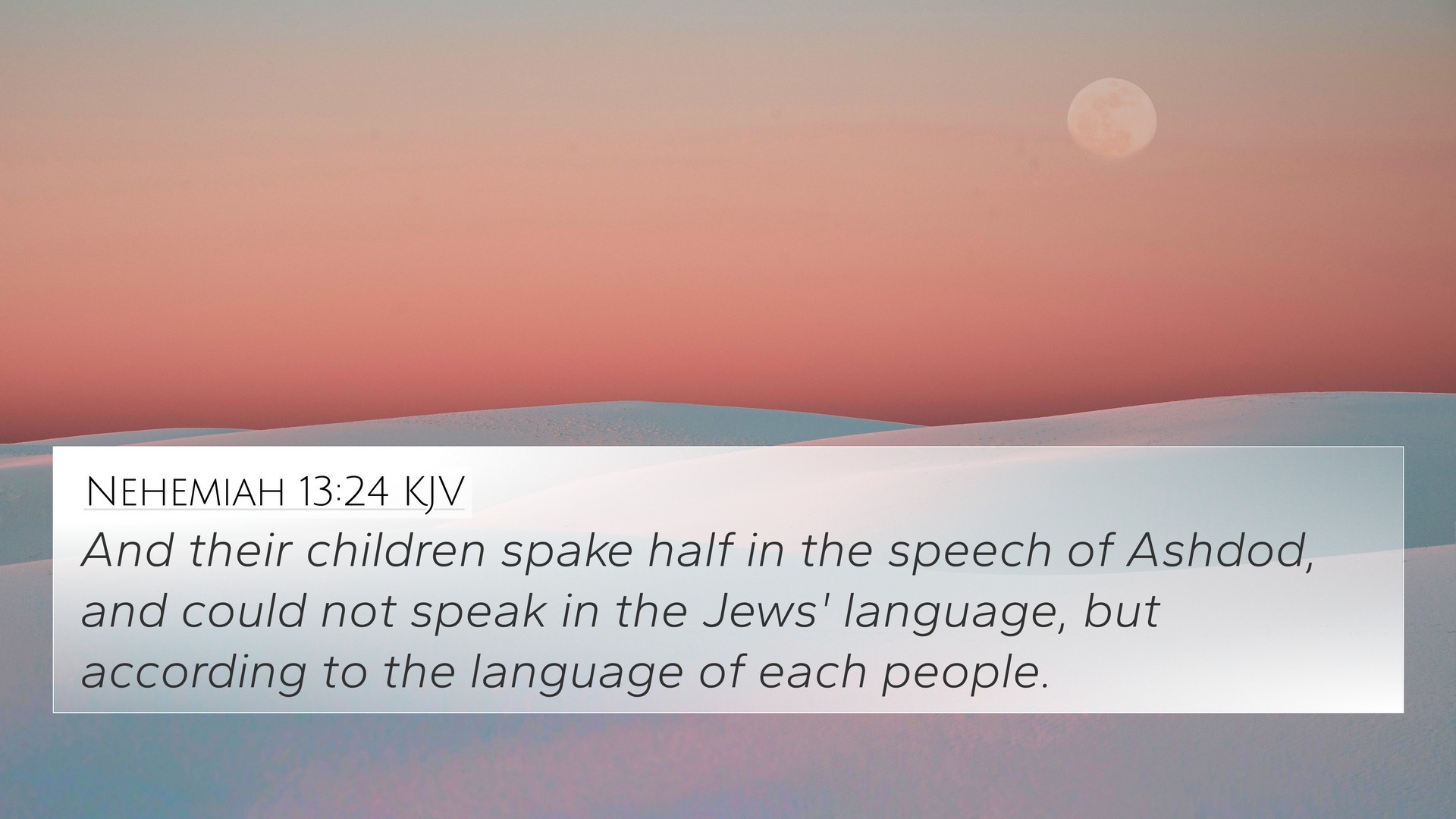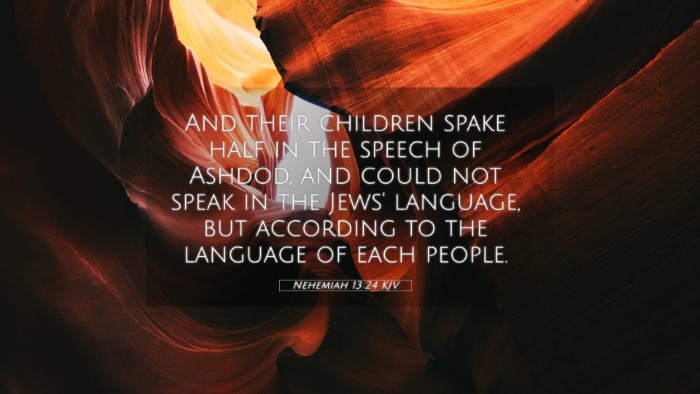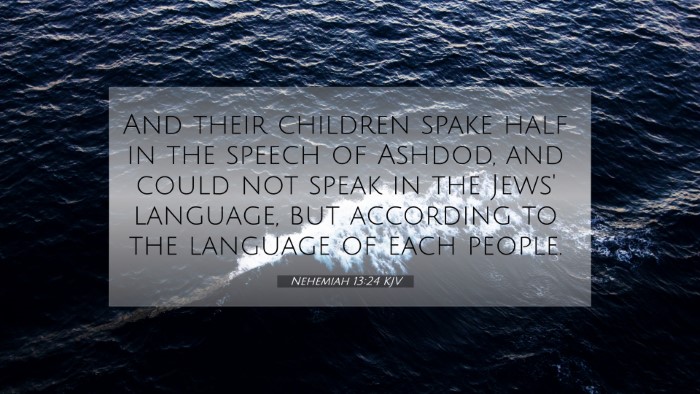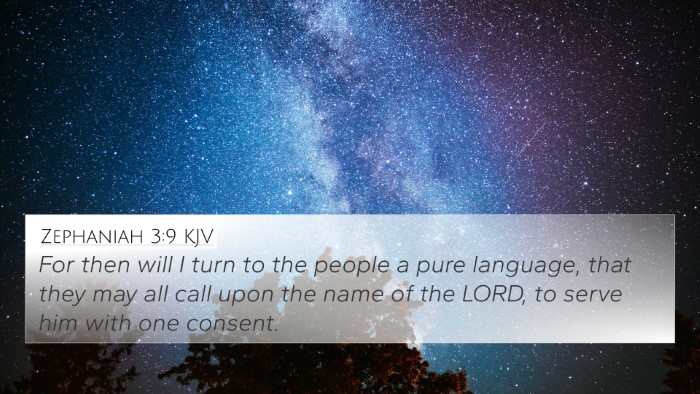Understanding Nehemiah 13:24
Nehemiah 13:24: "And their children spake half in the speech of Ashdod, and could not speak in the Jews' language, but according to the language of each people."
Summary and Interpretation
This verse reveals a significant cultural and linguistic challenge faced by the Jewish community during the time of Nehemiah. The children being unable to speak the Jewish language reflects a deeper issue of identity and assimilation among the Israelites, highlighting the consequences of intermarriage and mingling with surrounding nations.
Insights from Public Domain Commentaries
-
Matthew Henry:
Henry emphasizes the importance of language as a reflection of culture and identity. The fact that the children could not speak the language of their ancestors signifies a loss of cultural heritage. It serves as a warning against the dilution of faith and traditions through associations with those outside the community.
-
Albert Barnes:
Barnes discusses the practical implications of this linguistic divide. He notes that such a situation can lead to misunderstandings and divisions within the community. The inability to communicate in the Jewish language suggests a growing separation from their roots and a potential weakening of their religious obligations.
-
Adam Clarke:
Clarke connects this verse to broader themes of exile and restoration. He points out that these children represent a generation that has been raised in a foreign culture, and thus, the Jewish people must take active steps to ensure that their language—and by extension, their faith and customs—are preserved and passed down.
Thematic Connections and Cross-References
Nehemiah 13:24 presents profound themes of cultural integrity and identity preservation within the narrative of the Jewish return from exile. Below are related Bible verses that further explore these themes:
- Deuteronomy 7:3-4: Warns against intermarriage with surrounding nations, emphasizing the importance of maintaining cultural and spiritual purity.
- Ezra 9:1-2: Describes the issues of intermarriage and the consequent loss of Jewish identity during the return from Babylonian exile.
- Malachi 2:10-12: Discusses the covenant with God and how mixing with foreign nations leads to unfaithfulness.
- Proverbs 22:6: Highlights the importance of training children in their cultural and spiritual heritage.
- Acts 2:4: Points to the power of language and the Holy Spirit, suggesting that unity in language can reflect unity in faith.
- James 1:27: Encourages pure religion, which involves keeping oneself unspotted from the world, resonating with Nehemiah's call for purity amongst the Jews.
- Romans 12:2: Advises believers not to conform to the patterns of this world, reminding the faithful to uphold their identity.
- 1 Corinthians 15:33: Affirms that bad company corrupts good character, connecting back to the influences that led to the loss of the Jewish language and culture.
Connecting Themes and Lessons
The message in Nehemiah 13:24 serves as a pivotal reminder for contemporary readers about the importance of cultural identity, especially in faith-based communities. The verse teaches us that:
- Cultural Preservation: Engaging with and protecting one’s heritage is crucial for future generations.
- Importance of Language: Language is a tool of identity; thus, maintaining the language of faith can help preserve its teachings and traditions.
- Community Responsibility: Faith communities must actively teach and reinforce their beliefs and practices to ensure that cultural disconnection does not occur.
Tools for Bible Cross-Referencing
Understanding the connections between Bible verses can enhance one's grasp of scripture. Here are valuable resources for Bible cross-referencing:
- Bible Concordance
- Bible Cross-Reference Guide
- Cross-Reference Bible Study Techniques
- Bible Reference Resources for deeper study
- Tools for identifying connections between Old and New Testament
Conclusion
Nehemiah 13:24 sheds light on the crucial themes of heritage, identity, and the responsibility of faith communities to maintain their language and traditions. The insights from commentaries underscore the necessity of cultural preservation for the integrity of future generations. As individuals engage with scripture, recognizing the thematic connections and utilizing cross-reference tools proves invaluable for a comprehensive biblical understanding.



